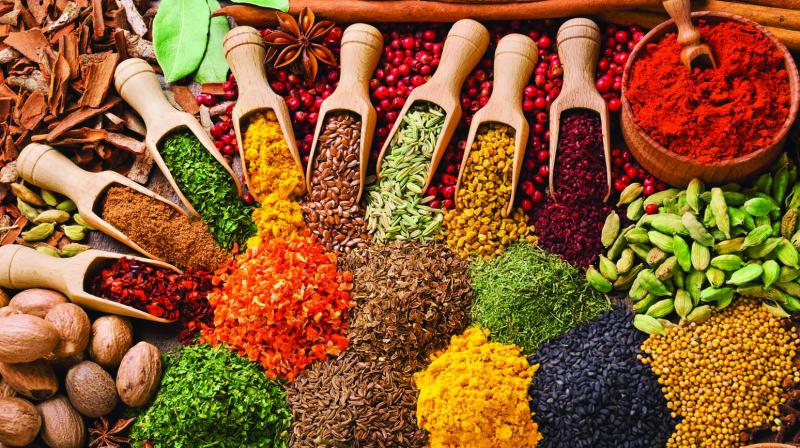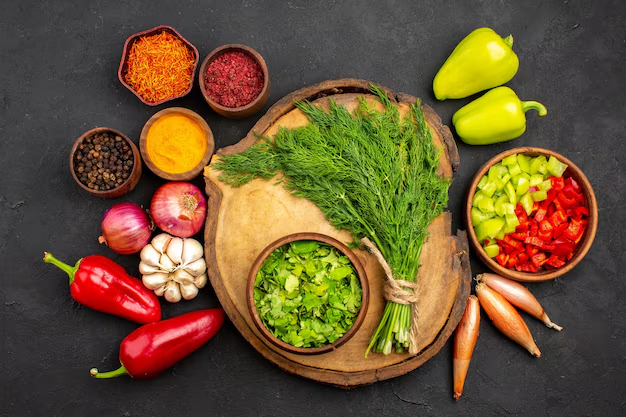Seasoning transforms bland vegetables into flavorful, aromatic, and nutritious dishes. Vegetable seasoning enhances taste, texture, and appeal while preserving natural goodness.
Proper seasoning balances flavors without overpowering the vegetables’ essence. Herbs, spices, oils, and citrus-based seasonings create depth, making healthy eating enjoyable.
Different vegetables require unique seasoning approaches. Leafy green vegetables pair well with garlic and lemon, while root vegetables absorb earthy spices like cumin and paprika.
The right vegetable seasoning improves digestion, boosts immunity, and reduces the need for excess salt or unhealthy additives.
Homemade seasoning blends offer freshness, control over ingredients, and a healthier alternative to store-bought options. Exploring global seasoning styles, from Mediterranean to Indian flavors, enhances vegetable-based meals.
Understanding seasoning techniques like marinating, roasting, and sautéing maximizes flavor infusion.
Mastering seasoning ensures vegetables remain the highlight of any meal. Experimenting with combinations unlocks endless possibilities for delicious, nutritious dishes.
This content delves into various vegetable seasoning blends, its nutritional benefits, and how to avoid certain mistakes when seasoning vegetables.
Understanding Vegetable Seasoning

A great vegetable seasoning enhances the natural flavor of vegetables. It consists of a combination of herbs, spices, salts, and acids that work together to create a balanced taste. Seasoning is different from spices—while spices come from dried seeds, bark, or roots, seasoning includes a broader range of ingredients like fresh herbs, oils, and citrus juices.
The right vegetable seasoning does more than improve taste. It boosts the nutritional value of a dish by adding antioxidants, vitamins, and minerals. For example, turmeric and black pepper enhance digestion, while garlic and oregano provide antibacterial properties.
Proper seasoning also helps reduce the need for excessive salt, making meals healthier without sacrificing flavor.
Vegetable seasoning isn’t just about taste—it’s about making vegetables more enjoyable and versatile. A well-seasoned vegetable dish can become the star of a meal, encouraging better eating habits and culinary creativity.
Types of Vegetable Seasoning
Vegetable seasoning comes in various forms, each adding unique flavors and health benefits. Understanding the different types of seasoning helps create well-balanced vegetable dishes. Vegetable Seasonings includes:
1. Herbs
Herbs are a fundamental part of seasoning. Fresh and dried varieties bring different intensities to a dish. Basil, oregano, thyme, and parsley are commonly used for their fragrant and earthy flavors. Fresh herbs provide a lighter taste, while dried herbs offer a more concentrated flavor. Combining the right herbs can enhance the natural sweetness or earthiness of vegetables.
2. Spices
Spices add depth and complexity to vegetable dishes. Paprika, cumin, turmeric, and black pepper are widely used in different cuisines. Paprika gives a smoky or sweet flavor, while cumin brings a warm, nutty essence. Turmeric, known for its anti-inflammatory properties, adds color and mild bitterness. Black pepper enhances absorption of nutrients while providing mild heat.
3. Salt-bases Seasoning
Salt-based seasonings help bring out the natural flavors of vegetables. Sea salt and Himalayan salt add minerals and enhance taste without overwhelming the dish. Garlic salt and onion salt offer additional depth. However, using salt in moderation prevents excessive sodium intake.
4. Citrus and vinegar-based seasonings
This seasoning introduces acidity, balancing flavors and cutting through bitterness. Lemon juice, lime juice, and apple cider vinegar add brightness and freshness to dishes. These ingredients work well with roasted and sautéed vegetables, enhancing their natural sweetness.
5. Oil-based seasonings
Oil-based s contributes richness and helps coat vegetables for even flavor distribution. Olive oil, sesame oil, and infused oils with garlic or chili add layers of complexity. Oils also help herbs and spices adhere to vegetables during cooking.
By experimenting with these types of vegetable seasoning, home cooks can create endless flavor combinations, ensuring that vegetable dishes remain exciting and nutritious.
Read More
Homemade Vegetable Egg Roll Recipe
Vegetable Lasagna With White Sauce
How To Make Knorr Vegetable Soup Mix
How to Choose the Right Seasoning for Different Vegetables.

Different vegetables have distinct textures and flavors, so selecting the right vegetable seasoning enhances their taste without overpowering them. The key is to balance seasonings with the vegetable’s natural profile.
Leafy greens like spinach, kale, and Swiss chard have a slightly bitter taste. They pair well with garlic, lemon juice, and olive oil. A pinch of sea salt enhances their flavor, while red pepper flakes add heat.
Root vegetables such as carrots, potatoes, and beets absorb seasoning well due to their dense texture. Earthy spices like cumin, paprika, and rosemary complement their natural sweetness. Roasting root vegetables with olive oil and a hint of black pepper intensifies their depth.
Cruciferous vegetables like broccoli, cauliflower, and Brussels sprouts have a slightly nutty and bitter flavor. Mustard seeds, turmeric, and garlic powder bring out their richness. Roasting with a blend of lemon juice and Parmesan enhances their crispiness.
Nightshade vegetables such as tomatoes, bell peppers, and eggplants have a naturally sweet and tangy taste. They pair well with basil, oregano, and balsamic vinegar. Grilling them with a drizzle of olive oil and fresh herbs enhances their flavor.
Using the right vegetable seasoning ensures vegetables remain delicious and well-balanced. Experimenting with different combinations keeps meals exciting while preserving the vegetables’ natural goodness.
Homemade Vegetable Seasoning Blends
Making homemade vegetable seasoning blends offers freshness, customization, and control over ingredients. Store-bought seasonings often contain preservatives, artificial flavors, or excess salt. Crafting your own ensures healthier and more flavorful meals.
A simple all-purpose blend includes garlic powder, onion powder, paprika, black pepper, and sea salt. This combination works well with most vegetables, adding depth without overpowering their natural taste.
For a Mediterranean-inspired blend, mix oregano, thyme, basil, rosemary, and lemon zest. This seasoning pairs well with zucchini, tomatoes, and bell peppers, giving dishes a fresh, aromatic taste.
A spicy blend for roasted vegetables includes cayenne pepper, smoked paprika, cumin, and garlic powder. This combination enhances the caramelization of vegetables like sweet potatoes and cauliflower.
To create an Asian-style seasoning, blend soy sauce powder, ginger, garlic powder, and sesame seeds. This works well for stir-fried greens and mushrooms.
Homemade seasoning blends should be stored in airtight containers away from direct sunlight to maintain freshness. Experimenting with different combinations ensures vegetables always have a vibrant, well-balanced flavor.
Health Benefits of Seasoning Vegetables Naturally
Using natural vegetable seasoning enhances both flavor and nutrition. Herbs, spices, citrus, and oils add essential vitamins, minerals, and antioxidants to vegetable dishes, making them more beneficial for overall health.
Many seasonings have anti-inflammatory properties. Turmeric contains curcumin, which reduces inflammation and supports joint health. Black pepper increases curcumin absorption, maximizing its benefits. Garlic and ginger boost the immune system, helping the body fight infections and diseases.
Seasoning vegetables naturally also helps reduce excessive salt intake. Many processed seasonings contain high sodium levels, leading to health risks like high blood pressure. Replacing salt with herbs and spices enhances taste without harming cardiovascular health. Basil, oregano, and rosemary add flavor without the need for extra salt.
Certain seasonings aid digestion and gut health. Cumin and fennel seeds help with bloating and indigestion, while lemon juice and apple cider vinegar promote a healthy gut environment. Fiber-rich vegetables combined with the right seasonings improve digestion and nutrient absorption.
Vegetables seasoned with healthy fats like olive oil or avocado oil provide essential fatty acids that support brain function and heart health. These oils help absorb fat-soluble vitamins like A, D, E, and K, ensuring the body gets the most nutrients from vegetables.
By using natural vegetable seasoning, meals become not only tastier but also more nutritious. Choosing the right combination of herbs and spices enhances well-being while making vegetables a more enjoyable part of daily meals.
Common Mistakes to Avoid When Seasoning Vegetables

Even with the best ingredients, mistakes in vegetable seasoning can negatively impact the final dish. Avoiding common seasoning errors ensures vegetables retain their natural flavors and textures while tasting their best.
One of the biggest mistakes is overpowering vegetables with too many strong seasonings. Some vegetables have delicate flavors that can be masked by excessive spices. For example, mild vegetables like zucchini and asparagus need light seasoning such as lemon juice and fresh herbs, rather than heavy spices. Using a balanced amount of seasoning enhances rather than dominates the dish.
Another mistake is relying too much on salt. While salt enhances flavor, overusing it can overshadow the natural sweetness of vegetables and create an unhealthy meal. Replacing some salt with herbs, citrus, or mild spices helps maintain flavor while keeping sodium levels in check.
Not considering the cooking method is another issue. Roasted vegetables need seasonings that can withstand high heat, such as paprika, rosemary, or cumin. Steamed vegetables require light dressings like olive oil and lemon zest to prevent them from tasting bland. Using the wrong seasoning method can result in underwhelming flavors.
Failing to marinate or coat vegetables properly also reduces flavor impact. Dry seasoning sprinkled unevenly may not adhere well, leading to an inconsistent taste. Mixing vegetables with oil or citrus juice before adding seasonings ensures an even coating and better flavor absorption.
Lastly, using stale or low-quality seasonings can weaken the overall taste. Herbs and spices lose potency over time. Storing them in airtight containers away from heat and light preserves their flavor.
By avoiding these mistakes, home cooks can make the most of vegetable seasoning, ensuring vegetables remain flavorful, balanced, and nutritious in every dish.
Conclusion
Mastering vegetable seasoning transforms simple vegetables into flavorful, nutritious, and satisfying dishes. The right combination of herbs, spices, citrus, and oils enhances taste while preserving the vegetables’ natural goodness. Seasoning not only improves flavor but also boosts nutritional value, adding antioxidants, vitamins, and minerals to every meal.
Homemade seasoning blends offer control over ingredients, reducing the need for processed options with excess salt and artificial additives. Avoiding common seasoning mistakes ensures balanced flavors and prevents overpowering the dish. Choosing the right seasoning for different vegetables and cooking methods maximizes their taste potential.
Experimenting with various seasoning techniques keeps vegetable-based meals exciting and enjoyable. Whether roasted, steamed, or sautéed, well-seasoned vegetables can become the highlight of any dish. By using natural, high-quality seasonings, home cooks can create delicious, healthy meals that encourage better eating habits and a deeper appreciation for fresh, wholesome ingredients.
